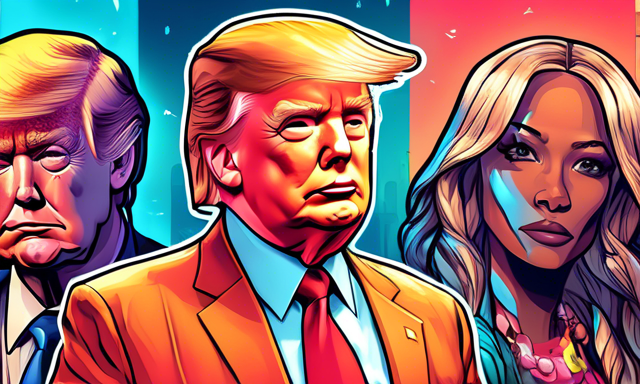Trump Marks Bitcoin’s 16th Anniversary While Targeting Kamala Harris 🎉
In a recent social media post on October 31, Republican candidate Donald Trump used Bitcoin’s 16th anniversary as a platform to critique his electoral rival, Vice President Kamala Harris. This year, as the race for the U.S. presidency heats up, Trump’s comments reflect both his support for cryptocurrency and his stance against Harris’s policies.
Trump’s Message on Crypto and Politics 📈
Trump extended his wishes to the Bitcoin community, saying, “Happy 16th Anniversary of Satoshi’s White Paper to our great Bitcoiners. We will end Kamala’s war on crypto, and Bitcoin will be MADE IN THE USA! VOTE TRUMP!” His tweet resonates with many supporters within the cryptocurrency sector, highlighting his intention to reshape digital asset policies in a more favorable direction.
Following Trump’s remarks, Bitcoin’s value fluctuated briefly, dipping into the high $68,000 range before recovering to above $70,000. This movement in Bitcoin’s price aligns with broader economic factors. Recent economic reports indicated slower job growth, which led to increased speculation regarding interest rate cuts from the Federal Reserve.
The current softer economic climate, coupled with favorable consumer indicators, serves as a supportive backdrop for high-risk assets like Bitcoin. These macroeconomic dynamics may continue to influence Bitcoin’s price trajectory as this year progresses.
Context of the U.S. Presidential Election 🗳️
Throughout his campaign, Trump has consistently emphasized his viewpoints on cryptocurrency. He has made promises to dismiss the current Securities and Exchange Commission (SEC) Chair, Gary Gensler, should he win the presidency. Moreover, Trump has been vocal about his disapproval of the SEC’s current enforcement strategies regarding digital assets, calling for a more nurturing regulatory approach.
During a campaign event in September 2024, Trump warned that a change in administration could lead to increased regulatory scrutiny for those involved in the cryptocurrency sphere. He expressed concerns about the potential backlash that could follow if Harris wins the election, underscoring how critical this electoral outcome is for the crypto community.
Conversely, Kamala Harris has positioned herself as a supporter of emerging technologies, including cryptocurrencies and artificial intelligence. Her campaign highlights an economic strategy that aims to protect consumers and investors while promoting innovation in the digital asset domain.
Harris’s Approach to Digital Assets and Economic Equity ✊
Alongside Minnesota Governor Tim Walz, Harris has crafted a detailed economic plan that includes measures aimed at engaging Black male voters—an influential demographic in the upcoming election. She has emphasized the necessity of safeguarding crypto investors and ensuring equitable participation in the digital market.
A recent agenda from Harris’ team outlined her commitment to fostering a regulatory environment that benefits cryptocurrency owners and investors, asserting that both financial security and innovation must go hand in hand.
As polling data indicates a close contest between Trump and Harris, the decisions made in the aftermath of this election could profoundly impact how digital assets are regulated in the United States. The outcome may set crucial precedents for how cryptocurrencies are treated under U.S. law, ultimately shaping the market’s future.
Hot Take: The Future of Crypto Regulations in the Wake of Election 🔮
The dynamic political landscape this year places the cryptocurrency market at a crucial juncture. With each candidate outlining distinct visions for digital assets, the stakes have never been higher. Trump’s proposals suggest a push for deregulation and encouragement of crypto innovation, whereas Harris appears focused on consumer protection and equitable access within the digital economy.
The electoral outcome could be pivotal, determining whether the regulatory framework will shift towards a more open, innovation-friendly environment or maintain a focus on consumer protections through more stringent rules. As the election approaches, keeping an eye on these evolving political narratives can offer valuable insights into the potential direction of U.S. cryptocurrency policies.





 By
By

 By
By
 By
By
 By
By
 By
By